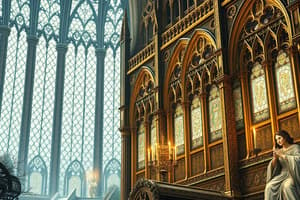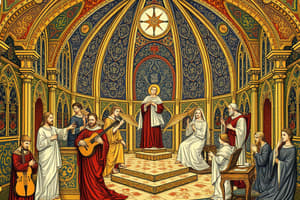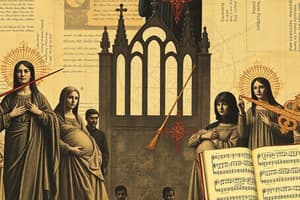Podcast
Questions and Answers
What event marked the beginning of the Medieval period?
What event marked the beginning of the Medieval period?
- The fall of Constantinople
- The establishment of the Catholic Church
- The signing of the Magna Carta
- The deposition of the last Roman emperor by Odoacer (correct)
Which of the following best defines Gregorian Chant?
Which of the following best defines Gregorian Chant?
- A narrative style of singing developed during the Baroque period
- Instrumental music that emerged in the Renaissance
- The official sacred music of the Christian Church during the Medieval period (correct)
- A form of secular music popular among nobles
What is the Neo-Latin term for Medieval?
What is the Neo-Latin term for Medieval?
- Medium Aevum (correct)
- Tempus Medium
- Medievalis
- Aevum Medium
Which institution significantly influenced the culture and politics of Europe during the Medieval period?
Which institution significantly influenced the culture and politics of Europe during the Medieval period?
Which musical period followed the Medieval period?
Which musical period followed the Medieval period?
Which section is NOT included in the Proper Mass?
Which section is NOT included in the Proper Mass?
What is the primary musical texture of medieval sacred music?
What is the primary musical texture of medieval sacred music?
Which of the following is a characteristic of the mass sung in Latin?
Which of the following is a characteristic of the mass sung in Latin?
What is the function of the Kyrie in the Ordinary Mass?
What is the function of the Kyrie in the Ordinary Mass?
Which medieval form is characterized by poems that utilize sarcasm?
Which medieval form is characterized by poems that utilize sarcasm?
What type of songs did troubadours primarily create?
What type of songs did troubadours primarily create?
Which genre does 'Chanson de geste' belong to?
Which genre does 'Chanson de geste' belong to?
Who is Adam de la Halle known for?
Who is Adam de la Halle known for?
What was the primary demand regarding church music that was stated?
What was the primary demand regarding church music that was stated?
Which of the following best describes Giovanni Pierluigi da Palestrina's contribution to music?
Which of the following best describes Giovanni Pierluigi da Palestrina's contribution to music?
What is a characteristic feature of a cantata?
What is a characteristic feature of a cantata?
What distinguishes a Dramatic Soprano from other soprano types?
What distinguishes a Dramatic Soprano from other soprano types?
Which statement is true regarding the definition of an oratorio?
Which statement is true regarding the definition of an oratorio?
Which instrument is NOT listed as part of the Renaissance musical ensemble?
Which instrument is NOT listed as part of the Renaissance musical ensemble?
How did Johann Sebastian Bach's early education contribute to his musical career?
How did Johann Sebastian Bach's early education contribute to his musical career?
Which vocal type is characterized by a warm tone and is considered a middle-range soprano?
Which vocal type is characterized by a warm tone and is considered a middle-range soprano?
Which Male Vocal Range is the lowest and powerful voice?
Which Male Vocal Range is the lowest and powerful voice?
What is the Text of Opera?
What is the Text of Opera?
Who is considered to be the greatest English composer of all time?
Who is considered to be the greatest English composer of all time?
What is one of the famous compositions of George Frideric Handel?
What is one of the famous compositions of George Frideric Handel?
Which Female Vocal range is the highest and most flexible voice in opera?
Which Female Vocal range is the highest and most flexible voice in opera?
Which group of musicians were successors to the Minnesingers?
Which group of musicians were successors to the Minnesingers?
What was one of the main focuses of the songs created by wandering students during the medieval period?
What was one of the main focuses of the songs created by wandering students during the medieval period?
What transformation began in 1517 that significantly affected church music?
What transformation began in 1517 that significantly affected church music?
Which form of music was specifically created to enhance congregational singing during the Reformation?
Which form of music was specifically created to enhance congregational singing during the Reformation?
Which aspect of church music did Martin Luther emphasize?
Which aspect of church music did Martin Luther emphasize?
What is a characteristic feature of the compositions associated with Meistersingers?
What is a characteristic feature of the compositions associated with Meistersingers?
What was the primary function of Latin in church worship according to the reforms?
What was the primary function of Latin in church worship according to the reforms?
Which element was notably present in the music composed by wandering students?
Which element was notably present in the music composed by wandering students?
Flashcards are hidden until you start studying
Study Notes
Medieval Period
- The Medieval period lasted from 476 - 1400
- The Medieval period began after the fall of the Western Roman Empire
- Odoacer, a German King, deposed the last Roman Emperor in Rome.
- The Catholic Church influenced politics and culture during this period.
- Most Europeans during this time were Christians under the Roman Catholic Church.
Music of the Medieval Period
- The Gregorian Chant emerged during the Medieval Period.
- Gregorian Chant was considered the official sacred music of the time.
- Pope Gregory I is credited with inventing the Gregorian Chant.
- Gregorian Chant was typically monophonic, with a limited range and often performed a capella.
- Gregorian Chant was sung in Latin.
The Medieval Mass
- The mass was divided into two main parts: the Proper and the Ordinary.
- The Proper included six sections: introit, gradual, alleluia, tract, offertory, and communion.
- The Proper was used during special occasions and feast days.
- The Ordinary contained constant portions of the mass and was performed frequently.
Sections of the Ordinary Mass
- Kyrie (Lord, have mercy on us)
- Gloria (Glory)
- Credo (Creed)
- Sanctus (Holy)
- Agnus Dei (Lamb of God)
Requiem Mass
- A eucharist service for the dead.
- Also called Missa pro defunctis.
- Included Kyrie, Sanctus, and Agnus Dei from the Ordinary.
- Included introit, offertory, and communion from the Proper.
Medieval Secular Music - Troubadours and Trouveres
- Written in monophonic texture with only one melodic line.
- Written in native languages.
- Featured free-flowing rhythm.
- Written by poet-musicians called Troubadours and Trouveres.
- Troubadours and Trouveres were educated and cultured men from the nobility class, residing in feudal courts.
Medieval Secular Songs
- Planh: a lament on the death of a distinguished person.
- Chanson de toile: a spinning song.
- Pastourelle: a song in dialogue form between a knight and a shepherdess.
- Chanson de geste: a narrative poetry with extraordinary characters.
- Canso: a poem of love.
- Tenso: a poem in the form of a dialogue.
- Sirventes & Enueg: poems that used sarcasm to expose follies.
- Aube: a song about a friend watching over lovers.
Adam de la Halle (1237-1287)
- Also known as "Adam the Hunchback," "Adam of Arras," or "Adam Le Bossu."
- Born in France in 1237.
- A trouvere, poet, and musician.
- One of the oldest secular composers.
- His works included chansons and poetic debate.
The Minnesingers
- They were poet-composers in Germany who followed the standards set by the French Troubadours.
- Minnesingers were from the nobility class.
- They sang love songs, known as Minnesang.
- Famous Minnesingers include Wislav von Rugen, Heinrich von Morungen, and Neidhart von Reuental.
The Meistersingers
- The Meistersingers were successors to the Minnesingers.
- They created their own form of music called Meistergesang.
- Famous Meistersingers include Adam Puschmann, Konrad Nachtigall, and Hans Sachs.
Medieval Conductus Songs
- Latin secular songs created by students during the Medieval period.
- Featured topics such as drinking, love, wandering, political satire, and vulgar topics.
The Song of the Sibyl
- Declared a masterpiece of Oral and Intangible Heritage of Humanity by UNESCO.
Renaissance Period
- The Renaissance period lasted from 1400-1600
Music of the Renaissance Period
- Features a three-part texture.
- Characterized by a homophonic texture.
- Often included solo songs with instrumental accompaniment.
- Characterized by use of intervals of thirds.
- Features four-part polyphony.
- Characterized by a predominance of imitation.
- Featured balanced polyphony and voice pairings.
The Protestant Reformation
- Martin Luther, a German theologian, began the Protestant Reformation in 1517.
- The Reformation split the Christian Church into Catholicism and Protestantism.
- Luther promoted chorales and congregational singing.
Lutheran Chorales
- Introduced by Martin Luther.
- Sung by the church congregation.
- Texts adapted from religious poetry.
- Performed a capella and in unison, but also with four-voice part arrangements.
John Calvin, a French Theologian
- Was a bolder reformer than Martin Luther within the Protestant Reformation.
- Demanded more demanding reforms to church music.
- He wanted to eliminate the use of Latin in church service.
The Renaissance Church
- Calvin demanded that psalms be the only appropriate music for worship.
- Psalms should be sung a capella, unaccompanied.
- Psalms should be sung in the native language of the congregation.
Renaissance Instruments
- Renaissance viols
- Lute
- Vihuela
- Recorder
- Trumpet
- Shawn
- Krummhorn
- Trombone
- Cornet
- Harpsichord
- Portative Organ
- Positive Organ
- Clavichord
Giovanni Pierluigi da Palestrina
- One of the most important Renaissance composers.
- Born in Palestrina, near Rome.
- His professional career was spent in the service of the church in Rome.
- Considered to be the "Prince of Music."
- He composed 105 masses, 68 offertories, and at least 140 madrigals.
- His famous Mass is the Missa Papae Marcelli (Pope Marcellus Mass), dedicated to Pope Marcellus II
Baroque Period
- The Baroque Period lasted from 1600 to 1750.
Baroque Music
- A period of significant musical experimentation.
- Featured colorful and dramatic music.
- Featured complex polyphony and homophony.
- Featured intricate rhythms and harmonies.
- Introduced the use of basso continuo, which provided a harmonic foundation for the melody.
- Featured instrumental music that became more important.
Baroque Vocal Music
- Cantata: vocal composition with instrumental accompaniment.
- Oratorio: vocal composition used in churches.
- Opera: musical drama performed on a stage.
- Libretto: text of an opera.
Baroque Operatic Voices
- Coloratura Soprano: is a type of operatic soprano voice that has the highest voice of all sopranos. It is also the lightest and most flexible sound in opera.
- Lyric Soprano: is a type of operatic soprano voice that has a warm quality and bright sound. It is considered the middle voice.
- Dramatic Soprano: is a type of operatic soprano voice with powerful and rich voice. It is the darkest and most powerful voice.
- Lyric Tenor: a moderately light male voice.
- Dramatic Tenor: a rather high and powerful male voice.
- Basso Buffo: a low male voice
- Basso Profundo: a very low and powerful male voice.
Johann Sebastian Bach (1685-1750)
- Born in Eisenach, Germany.
- Came from a family of musicians.
- Learned to play harpsichord and violin from his father, Johann Ambrosius Bach.
- Learned to play clavicord from his brother, Johann Christoph Bach.
- Studied at St. Michael’s School in Luneburg.
- Served as court conductor for Leopold, the Prince of Anhalt-Kothen.
- Became the director of the Leipzig Collegium Musicum, a student organization in Germany that provided weekly concerts at a coffeehouse.
- Served as musical director of Thomasschule in Leipzig.
- Served as composer in the Royal Court for August III.
Johann Sebastian Bach: Famous Compositions
- Brandenburg Concertos
- Mass in B Minor
- Well-Tempered Clavier
- Sleepers, Wake
- Suites
- Before Thy Throne, My God, I Stand
- Passions
- Toccata in D Minor
Henry Purcell (1659-1695)
- Born in London.
- Considered the greatest English composer of all time.
- Came from a family of musicians.
- Began composing at age 9.
- Began as a choirboy in the chapel and became the organist.
- His compositions consisted of church music, secular music for choir, songs, vocal chamber music, and music for small groups of instruments.
- Famous compositions include Lord, Who Can Tell, They That Go Down to the Sea in Ships, and Sweeter Than Roses.
George Frideric Handel (1685-1759)
- Born in Halle, Germany.
- Considered to be a brilliant composer of English oratorio and Italian Opera.
- Composed 42 operas, 29 oratorios, and 120 cantatas.
George Frideric Handel: Famous Compositions
- The Messiah: a famous oratorio composed in 1741.
- The Hallelujah Chorus: the most popular work in choral music.
Studying That Suits You
Use AI to generate personalized quizzes and flashcards to suit your learning preferences.




